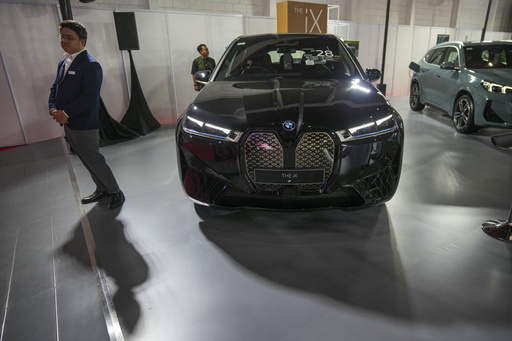
JAKARTA, Indonesia — The future landscape of Indonesia’s automotive sector appears to be shifting toward electric vehicles, according to exhibitors at the Indonesia International Motor Show that took place in Jakarta on Thursday.
Despite this optimistic outlook at the exhibition, electric vehicles (EVs) and electric motorbikes currently comprise only a small percentage of the total vehicles in Indonesia, which is the world’s fourth most populous nation.
The show showcased over 50 domestic and international automotive brands, many of which were presenting their hybrid or electric offerings for the first time in Indonesia. Among the highlights were BYD’s unveiling of the Sealion 7 electric SUV and Vietnam’s VinFast debuting its VF 3 electric mini SUV.
Adding to the event, new player Honri from China introduced its five-passenger Boma EV model to the Indonesian market. Although the floor was predominantly occupied by Asian manufacturers, some notable global brands like Germany’s Volkswagen and BMW’s Mini were also in attendance.
Motorcycles also played a significant role in the exhibition, reflecting Indonesia’s status as home to one of the largest motorcycle fleets globally, with over 132 million registered in 2023. The event displayed a mixture of internationally branded bikes like Royal Enfields and Vespas, alongside locally produced Alvas.
A relatively small segment of the show featured traditional fuel-powered jet skis and boats, which can often be spotted in the country’s extensive coastlines, rivers, and lakes, given its more than 17,000 islands.
Outside the exhibition center, participants were seen test-driving new vehicles, relishing the new-car smell, as enthusiastic leasing agents and sales representatives greeted them upon finishing their test runs.
The expo commenced against a backdrop of challenges in Indonesia’s automotive sector, which experienced a nearly 14% decline in sales from 2023 to 2024, dropping from 1 million to 866,000 units, as noted by the Indonesian Automotive Manufacturers Association. The total number of registered vehicles stood at 24,646,825 units in 2023.
Agus Gumiwang Kartasasmita, Indonesia’s Minister of Industry, expressed that such events are pivotal for revitalizing the sluggish automotive industry. He highlighted the need for all stakeholders, including government bodies, to adopt strategic measures to foster consumer interest in vehicle purchases.
Although sales of electric vehicles and motorbikes are on the rise, they still represent only 7% of the nation’s total vehicle fleet, according to insights from consulting firm PwC. Significant barriers remain for the widespread adoption of EVs in Indonesia, such as insufficient infrastructure, high initial costs, and performance concerns, as highlighted in a 2023 report by the Institute for Essential Services Reform, a local NGO.
Recognizing these challenges, some EV manufacturers are actively seeking solutions. VinFast, for instance, is collaborating with V-Green, a subsidiary focused on developing charging stations, to establish 30,000 charging points across Indonesia, according to VinFast Asia CEO Pham Sanh Chau.
Chau emphasized, “Without charging infrastructure, we cannot sell the car. That’s why we are committed to building the entire ecosystem.”
In addition to establishing charging networks, VinFast, along with other EV producers like BYD, is pursuing the setup of manufacturing plants in Indonesia. South Korean company Hyundai and China’s Wuling have already established EV production facilities in the country since 2022.
Furthermore, the Indonesian government is eager to attract partnerships with manufacturers to position the nation as a key international player in the EV market, leveraging its rich resources needed for battery production.
The relatively modest sales figures reflect the broader slow transition towards renewable energy in Indonesia. Despite receiving significant funding aimed at reducing coal dependency and moving towards greener alternatives, the country’s renewable energy sources constituted just 14% of the energy mix in 2024, with fossil fuels, particularly coal, still dominating the energy landscape.

